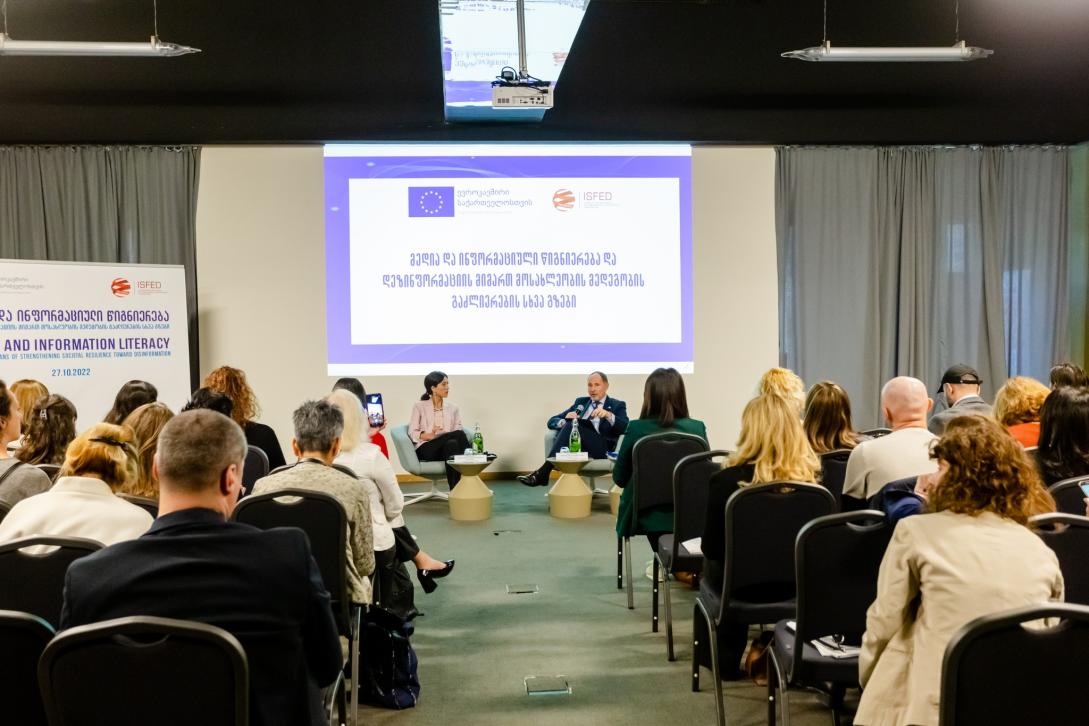Opening remarks by the EU Ambassador to Georgia Pawel Herczynski at the EU-funded Conference on media literacy and other means of strengthening society's resistance to disinformation

Thank you Nino, and thanks to ISFED team, for organizing this Conference, and for working closely with the Delegation for many years.
Let me start by saying that this is an important and timely event.
I think we all agree that disinformation is a security threat. It sows division within our societies and undermines our democracies by eroding trust in the rule of law, elected institutions, democratic values and media. So, by building resilience against disinformation, we defend our societies.
Speaking of defenders, we asked local fact-checkers, researchers and media literacy specialists from leading NGOs how media literacy helps respond to disinformation.
I see some of them in this room today, and I think it’s worth repeating what they said.
- Disinformation is a powerful weapon but media literacy is a survival skill to navigate the chaotic information ecosystem.
- Debunking is a treatment against the spread of disinformation, while media literacy ensures long-term immunity against it.
- Media literacy helps us examine and analyze content and context, and understand how the media influences target audiences.
When I hear this from experts working on the ground, two things are clear to me.
One - disinformation is among key challenges we are facing globally. Like a virus, it affects all of us and changes the way we look at the world. And two - media literacy is an effective remedy against disinformation, but it takes time to yield results.
All of us gathered here today know very well that there is certainly no “one-size-fits-all” solution to heal the world of distorted facts and corroded trust. However, collectively, we can increase our immunity to disinformation and fight back effectively.
So, what can we do in the absence of a silver bullet that would provide a quick and easy fix to the problems we face as a society living in a post truth world, where facts are considered arbitrary, information is weaponized, and fake news, half-truths and conspiracy theories can do as much harm as bullets or bombs?
Over the course of the last few years, and certainly since the start of Russia’s unprovoked and unjustifiable war against Ukraine, the EU has stepped up its game, expanded its capacity allocated additional resources and applied sanctions to push back against malign actors, be it domestic or foreign.
In her video address, the Head of East Stratcom Task Force will discuss in more detail how EU is tacking disinformation, foreign interference and information manipulations at home and abroad.
For one, East Stratcom’s EUvsDisinformation platform launched a new Learn page this week, packed with useful tools and resources based on the collective experience gained since its creation back in 2015.
Earlier this month, the European Commission published Guidelines for teachers and educators in primary and secondary schools to help them teach the youth how to spot disinformation and navigate the digital world safely. In the coming months, the Delegation will facilitate translation of the guidelines into Georgian and I urge you to make use of them.
At the EU Delegation, we made countering disinformation a crosscutting issue for our projects and EaP-wide regional activities. We supported a range of efforts from targeted trainings on media literacy and disinformation for multipliers, to capacity building of key actors, and even a door-to-door fact checking campaign to promote Covid-19 vaccination - to name only a few.
Most recently, the title of History Keepers was awarded to 6 Georgian and Ukrainian journalists, activists and academia representatives for their contributions to creating a network of solidarity and mitigating Russian disinformation.
We intend to continue our involvement in this field. Very soon, the EU Delegation will be launching a new project on media development and grassroots-level media literacy.
At the same time, to combat disinformation here and now, we must also find short- and medium-term solutions to push the needle in the right direction.
In Georgia, as in many other countries, at the forefront of the war waged daily against disinformation are people like you –fact-checkers, social media monitors, researchers, investigative journalists, working for the civil society organizations, media outlets, professional associations, think tanks, and so on.
Your tireless efforts are truly commendable and you are doing a great service to your country and to the Georgian people.
The wealth of knowledge you produce and your diverse experience should be fully harnessed by all relevant stakeholders to ensure that Georgia’s approach to combating disinformation is pro-active, comprehensive and multi-sectoral.
I see some of you holding a Georgian translation of Peter Pomerantsev’s book about propaganda. I’m reminded of what he said at the book launch organized by ISFED in Tbilisi, that we should be reaching out to the people the disinformation actors are talking to and whose convictions may differ from ours, in the hopes of finding a common ground.
Coincidentally, UNESCO’s theme for this year’s Global Media and Information Week is "Nurturing trust: A Media and Information Literacy Imperative".
To build trust, it’s important to reach across the isle and talk to people outside our own bubbles. Because no matter how well we prepare, after all, every chain is only as strong as its weakest link.
The EU is here to support Georgia. We are ready to work with all interlocutors to help Georgian people become more resilient and well armored against disinformation as you progress on the European path.
With this, let me now hand over these certificates to ISFED’s media literacy trainers and thank them for the job well done.
I wish you a fruitful panel discussion and look forward to hearing about the outcomes.
Didi madloba!
